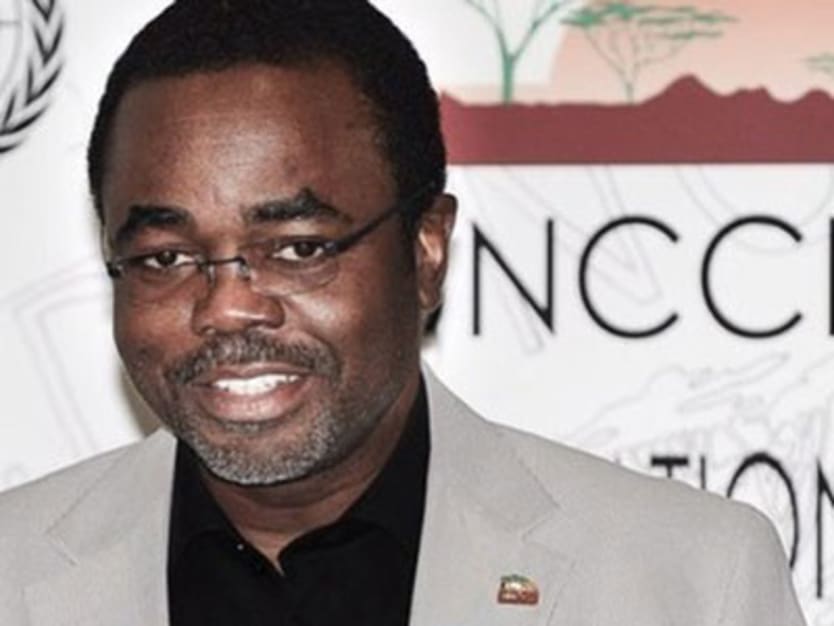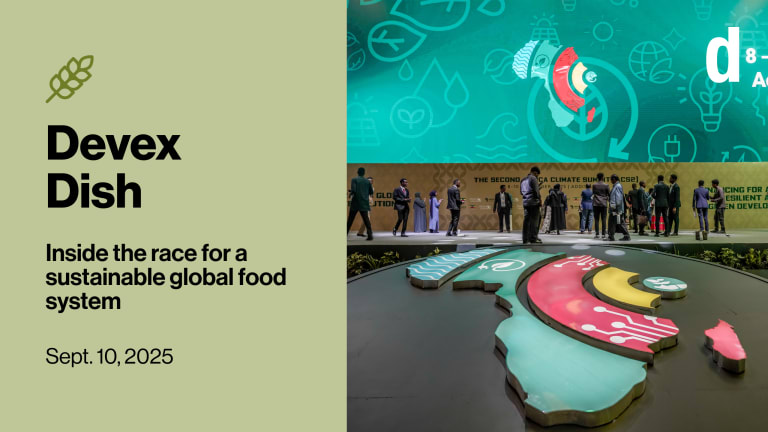
A high-level meeting in Geneva coming to a close today is seen as a success. Government and development leaders have agreed to encourage governments to develop and implement national drought management policies. But this is only the beginning of a more rigorous process.
Drought affects food security and sometimes leads to unrest. Despite its predictability, there remains a huge gap in the way the aid community addresses it, suggested the executive secretary of the United Nations Convention to Combat Desertification, who spoke to Devex ahead of today’s closing of the U.N.-organized high-level meeting on national drought policy.
Donors often “end up investing resources in relief,” Luc Gnacadja said. He strongly emphasized the need for the aid community to move from crisis management to preparedness and risk management.
“Post-disaster relief is way costlier than drought preparedness and risk management,” he said.
UNCCD’s main mandate is to help avoid land degradation and restore land in arid and semiarid regions, by assisting governments to develop national policies that can help mitigate effects of drought and land degradation. But the “very weak attention being given to land use” has been a big challenge for the convention.
UNCCD plans to drum up attention to land management, with the goal of pushing for its inclusion in the post-2015 development agenda. The convention has a number of influential “drylands ambassadors”: economist Jeffrey Sachs, South African singer Deborah Fraser and Spanish football player Carlos Marchena. Pedro Verona Rodrigues Pires, a former president of Cape Verde, and Princess Basma bint Ali of Jordan are also expected to come on board this year.
In this exclusive interview, Gnacadja explains why land management should be a stand-alone goal in the post-2015 agenda and how the aid community can address the challenges of mitigating land degradation and droughts.
This week’s meeting is the first time drought mitigation is being discussed at such high political level. What are your expected outcomes from the weeklong event?
The purpose of this is … to raise the political profile of the need to move from crisis management toward preparedness and risk management, and hopefully agree that governments will proceed and start establishing those qualities.
From Monday, experts and scientists, they have laid the ground to bring the evidences of why we should keep away from crisis management toward preparedness and risk management. This is evident. We know how to do it, we know it’s feasible, we have enough capability for early warning. The need now is how to translate early warning into early action, and build resilience of ecosystem and communities to drought.Is there a specific role for donors and aid implementers?
This is not only about more resources. It is also [about having] an efficient [way of managing] available [resources], especially when you consider that relief approach … is costly. So we are calling for a real-shift in that regard. Yes, there will be a need for capacity development, there will be a need for [change] to what we have been used to — meaning from waiting till we have the occurrence of drought before reacting to moving toward a more proactive approach.
There has been a call from developing nations for rich countries to provide financial assistance and technology transfer with regard to building national drought management policies. How are rich nations responding to that?
Well, [it is] imperative for all of us to better use the resources we have. Development partners, donor countries, they end up investing resources in relief … like the one we have had to face in 2011 in the Horn of Africa.
It has been forecasted that drought in 2011 in the Horn will be severe. And imagine [if] preparedness has been in place … we would not have experienced what we have experienced where we lost 50,000 lives, mostly women and children. And now, the ecosystem is not even ready yet to bounce back to its normal system of functioning.
So, I hope that both the development partners, the humanitarian partners as well as local national governments work together in a matter of efficiency in using available resources.
There’s a lot of buzz on the post-2015 agenda and the sustainable development gaols. Do you think land management should be a separate goal or factored into other goals such as food security or environment?
We should learn from the successes as well as the shortcomings of our drive toward the MDGs. We have noticed that to some extent there have been some successes in poverty alleviation, but at the same time, we have seen some shortcomings in food security and hunger. There still are close to 1 billion people living in deep hunger.
When you identify the situation, where they live, most of them are living in rural areas in developing countries … Some of them could not feed themselves anymore because their land has been experiencing differing trend since a number of decades. The way to get them out of poverty and also achieve environmental sustainabability is to invest into their asset.
We need to change the way we look at their asset. Land should not be seen as land we can afford to forsake. … We need to invest to bring them to potential functioning. What does it mean? When a land is degraded, it means if we invest into it, you can double, triple the output. If you do that, you are not only enhancing it, but also improving the livelihood of those who depend directly on the ecosystem.
So we need to learn those lessons while we’re sketching the post-2015 global framework for development.
Soil is not renewable. So [we can’t continue] losing soil at the pace we’re losing it — every single year, we are losing 20 million tons of soil due to the erosion occurring in our crop land. We can’t continue that.
So we need, as we are working in the post-2015 global development framework, to also have a stand-alone development goal on land to attain about land as a natural capital and protect our soil and restore degraded land. In Rio, there have been quite a call for a change in paradigm in the way we manage our land. In paragraph 206 of the Future We Want, it says that heads of state and governments, they decide to strive toward a land degradation neutral world, which means, to avoid degradation.
That is why we hope that as discussions are under way in New York, that those two processes — the post-2015 development agenda and the one on sustainable development — will converge on that regard.
Land management, unfortunately, has not received much attention in international development. How do you plan to push for its inclusion and galvanize support behind it in post-2015 talks given the broad array of goals being proposed?
We, first of all, on that take, [will] reach out to governments, to all stakeholders, including the private sector and civil society organizations, to bring them to understand that when we talk about poverty alleviation, we talk about sustainability and we want to match future demand in the nexus of food, energy, water. In that nexus, the natural capital we will depend on heavily is land.
So we’ll reach out to them and call on them to ensure they come together with that understanding. You know, in the run-up to Rio, there have been a number of … U.N. member states that have promoted the idea of land degradation neutrality … Now we do hope that those group of countries will continue standing for this imperative and advocate for it.
Africa has been one of the group of countries that really stand for land degradation neutrality and fight for it, as well as the European Union and [many other] countries that actually understand that natural capital that is overlooked is something we can no longer afford.
In fact, when you consider our global aim to sustainably manage our forest, we will not make it unless we focus on restoring degraded land and avoiding land degradation because degradation of land is the first driver of deforestation.
A few weeks ago, I was in Niger. We need to learn from what is occurring at the grass-roots level. In Niger, in the last two decades, through what has been labeled “farmer-managed natural regeneration,” more than 5 million hectares have been restored by farmers, where you can see the population have almost doubled in that timespan, and you have more animal and more trees.
It means that it’s possible, it’s feasible.
In some of those communities, in 2011, when drought hit again the region, those who have been working that way … they have been able to withstand drought and even been food secure.
How do you plan to reach out to them?
We will continue what we have started in the run-up to Rio+20 — targeting group of stakeholders, [for instance] governments … [to] bring more additional evidence to them of why there is a need to have a stand-alone goal on land.
We are also targeting civil society organizations. We have dryland ambassadors; they are very well-known authorities in politics, in the media. And they have accepted to devote part of their time in taking this issue further.
We also endeavor to work with the private sector. They are in fact the problem, and they can be a greater part of the solution, because it is ill-designed investment which is also driving degradation.
This is about governments setting or adjusting policies, and businesses also changing some of their business processes.
Read more development aid news online, and subscribe to The Development Newswire to receive top international development headlines from the world’s leading donors, news sources and opinion leaders — emailed to you FREE every business day.
Search for articles
Most Read
- 1
- 2
- 3
- 4
- 5








